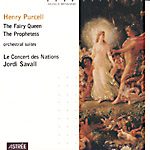The suite from Henry Purcell’s opera The Fairy Queen (1692) is the more substantial and more interesting of the two works on this disc. It is rich in melodic invention, colorful orchestration, and rhythmic variety. Purcell’s considerable skill in creating sonic effects is showcased in the second act “Echo”, where the trumpet fanfare is echoed not once but twice, the second time using the hautbois to create the illusion of distance. The lively dotted rhythms of the second act “Air” and the “Dance of the Fairies” evoke a pulse in which you can detect hints of early rock and roll, while trumpets and drums resound in the fourth act Symphony, creating a Handelian grandeur.
The suite from the Prophetess (1690) contains only seven numbers (the Fairy Queen has 27) which are all in the same key, yet still display Purcell’s compositional fecundity. The best numbers are the solemn “First Musick”, which opens the work, and the dramatic “Dance of the Furies”. The musicians of Les Concert des Nations are natural exponents of the Purcell’s style, and masters of their instruments (though it appears that period trumpets remain a challenge to play with absolute purity of tone). Jordi Savall invests his readings with much care and enthusiasm. Astrée’s sound is at once detailed and resonant. A treat for lovers of the Baroque. [5/19/2000]
































